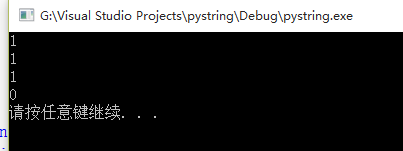【C++实现python字符串函数库】二:字符串匹配函数startswith与endswith
【C++实现python字符串函数库】字符串匹配函数startswith与endswith
这两个函数用于匹配字符串的开头或末尾,判断是否包含另一个字符串,它们返回bool值。startswith()函数判断文本的指定范围字符段是否以某个字符开始,endswith()函数判断文本是否以某个字符结束。默认的指定范围为整个字符串:
>>> >>> a 'abcdefghijklmn' >>> a.startswith('abc') True >>> a.endswith('klmn') True >>> a.startswith('bc') False >>> a.endswith('nm') False >>> 也可以指定一个匹配范围:
>>> >>> a 'abcdefghijklmn' >>> a.startswith('cd',2,10) True >>> python字符串范围校准。
在使用字符串函数时,很多时候我们可以使用start与end参数来指定要进行操作的字符串的一个范围。例如在上面的函数中我们就使用到了 ('cd',2,10) 语句,来对字符串a下标从2~10的范围进行匹配操作。
当我们输入的范围不合法时,python是如何处理的呢?例如我们输入了一个负数的 start 或者输入一个远大于字符串长度的 end ,python的处理绝不是以字符串开始或结束位置作为标准来校正范围,请看下面这段程序:
>>> a 'abcdefghijklmn' >>> len(a) 14 >>> a.startswith('ef',-10,10) #实际范围:(-10+14,10)=(4,10)具体的校准方法,我们可以使用这函数来描述:
void AdjustIndices(int &start, int&end, std::string::size_type len) { //如果end超出字符串长度 if (end > len) end = len; //则以字符串长度为准 else if (end < 0) {//如果end为负数 end += len; //则先加上字符串长度 if (end < 0)//如果还是为负数 end = 0;//则为0 } //如果start为负数 if (start < 0) { //则加上字符串长度,注意不是以0校准 start += len; if (start < 0)//如果还是负数 start = 0;//才以0校准 } }然而在我们的函数库实现中,我们并不打算把范围校准操作作为一个函数。我们将它作为一个宏来处理,原因如下:
- 操作简单,不会出来宏函数常见的问题,直接的替换足以解决问题。
- 省去函数调用的花销
- 多个地方都需要范围校准。
C++实现
范围校准宏
#define ADJUST_INDICES(start, end, len) / if (end > len) / end = len; / else if (end < 0) { / end += len; / if (end < 0) / end = 0; / } / if (start < 0) { / start += len; / if (start < 0) / start = 0; / } 有上面的解说,这段宏定义应该看得懂。
_string_tailmatch函数
//匹配函数:endswith与startwith的内部调用函数 int _string_tailmatch(const std::string&self, const std::string&substr, int start, int end, int direction) { int selflen = self.size(); int slen = substr.size(); const char* str = self.c_str(); const char* sub = substr.c_str(); //对输入的范围进行校准 ADJUST_INDICES(start, end, selflen); //字符串头部匹配(即startswith) if (direction < 0) { if (start + slen>selflen) return 0; } //字符串尾部匹配(即endswith) else { if (end - start<slen || start>selflen) return 0; if (end - slen > start) start = end - slen; } if (end - start >= slen) //mcmcmp函数用于比较buf1与buf2的前n个字节 return !std::memcmp(str + start, sub, slen); return 0; }endswith函数
bool endswith(const std::string&str, const std::string&suffix, int start = 0, int end = MAX_32BIT_INT) { //调用_string_tailmatch函数,参数+1表示字符串尾部匹配 int result = _string_tailmatch(str, suffix, start, end, +1); return static_cast<bool>(result); } startswith函数
bool startswith(const std::string&str, const std::string&suffix, int start = 0, int end = MAX_32BIT_INT) { //调用_string_tailmatch函数,参数-1表示字符串头部匹配 int result = _string_tailmatch(str, suffix, start, end, -1); return static_cast<bool>(result); } 测试
string str = "abcdefghijklmn"; string temp1 = "ab"; cout << startswith(str, temp1)<<endl;//使用默认参数 string temp2 = "mn"; cout << endswith(str, temp2) << endl; string temp3 = "ef"; cout << startswith(str, temp3, 4, 10)<<endl; string temp4 = "qq"; cout << startswith(str, temp3, 0, 100) << endl;测试结果

正文到此结束
热门推荐
相关文章
Loading...











![[HBLOG]公众号](http://www.liuhaihua.cn/img/qrcode_gzh.jpg)

